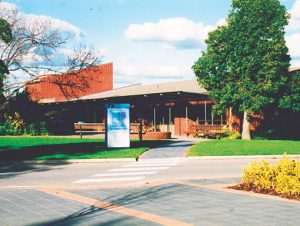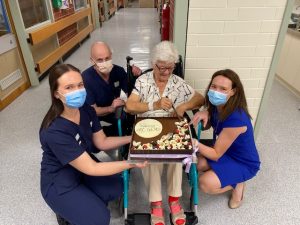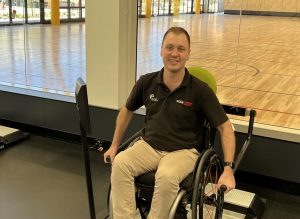A Central Adelaide program catering for older patients awaiting permanent residential care placement has relocated to Hampstead Rehabilitation Centre (HRC), enhancing patient recovery through the delivery of sub-acute care in conjunction with support from allied health services.
Now known as HRC 1C Care Awaiting Placement (CAP), the short-term admission program will be housed alongside many of Central Adelaide’s neurological and rehabilitation programs at Hampstead. The service was originally located St Margaret’s Hospital however moved last year to a private provider following damage found in underground pipes.
The CAP program joins the General Rehabilitation wards at Hampstead, along with Geriatric Evaluation and Management Unit and the 2A Transitional Ward, after the Statewide Rehabilitation Services relocated to the Repat Health Precinct in February.
“Seamless” relocation to Hampstead
Central Adelaide Local Health Network (CALHN) CAP Nurse Unit Manager, Sheila Sullivan, said 40 staff were involved in relocation, with contributions from the team’s nurses, doctors, allied health, social and welfare work clinicians, and their pharmacist.
“We started preparing three weeks ago, packing up the ward with removalists moving boxes. All boxes, beds and equipment including computers were moved over three days,” Sheila says.
“It was a very big job preparing before we transferred the patients, but it all went seamlessly.
“It’s like a new beginning, its lovely and fresh, although our patients will not have noticed any change of care.”
A welcome pack for the staff upon arrival at Hampstead included a staff orientation booklet, coffee voucher, chocolates and was “well-received”, she says.
The program’s move was prompted by a major plumbing issue occurring at St Margaret’s Hospital last May, with the team moving temporarily into the Lourdes Valley facility at Myrtle Bank.
Enhanced recovery
Sheila says the 50-strong nursing and multi-disciplinary CAP team was now enjoying settling into the Hampstead precinct.
“We are now under the same roof as many of Central Adelaide’s neurological and rehabilitation programs, ensuring the clinical and medical resources are all together,” she says.
The CAP program caters for patients no longer requiring acute care at The Queen Elizabeth Hospital or the Royal Adelaide Hospital, but who are also not well enough to go directly home.
All patients are aged over 65, with 80 per cent experiencing recurrent falls at home.
“They come to us for a range of reasons, including awaiting respite care or a slow stream rehabilitation program, or a permanent place in a residential aged care facility,” she says.
“Often, it can be that due to aging, their circumstances have changed. They may have had a fall at home and are now not as mobile or independent as they were. We do have patients that are able to return to their homes once we have arranged the appropriate services to support them.
“We work closely with the patients and their families to ensure that they are discharging safely to the correct destination for their needs,” Sheila says.
Praise for resilient, committed staff
Sheila highlighted the staff’s flexible, resilient attitude throughout the multiple relocations and their ongoing high quality, patient-centred care of the vulnerable patients and their families.
“The team has been remarkable; they have displayed great resilience,” she says.
“In the past 10 months they have moved locations twice and worked through a COVID outbreak with 50 per cent of our patients and 60 per cent of our staff testing positive.
“I feel privileged to have the most amazing team and I am constantly in awe of their commitment, resilience, positivity and most of all kindness, not only to the patients and their families, but also towards each other.”



